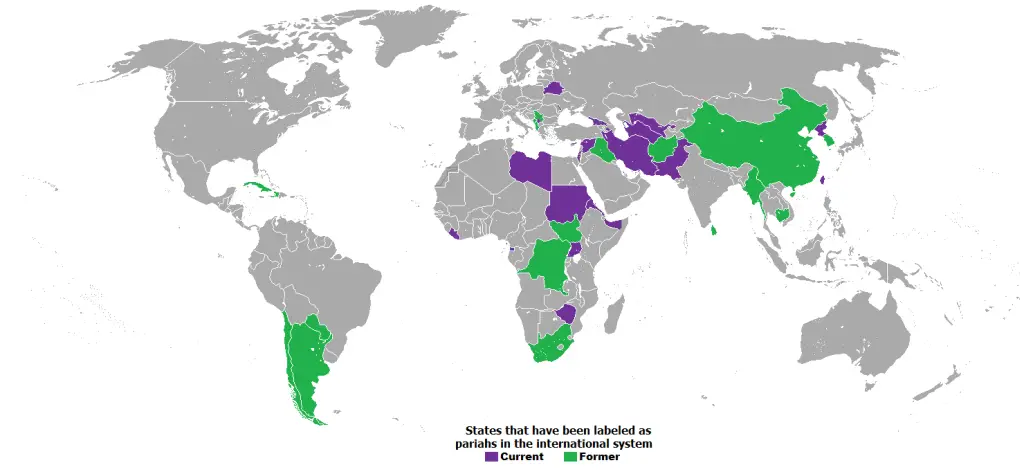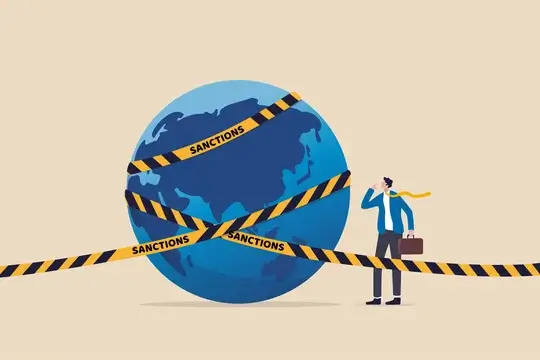A democratic and diplomatic nation is defined by how its governing policies benefit its citizens and the outside world.
Most nations have achieved and upheld positive social, economic, and diplomatic relations with their citizens.
However, the same cannot be said about a handful of states whose policies are not citizen-friendly, attracting criticism and isolation from the international community.
Such countries have little regard for human rights, and while some have worked towards improving their governing policies, others have remained unhinged by the international call for change.
A great example of a pariah state is Russia, whose brutal Ukraine invasion has caused an international uproar and prompted countries to sever their ties to the Asian country.
Do the shunned nations have a name? Which nations are these, and what does being shut off from the international community mean to them? Also, do they stand a chance at rejoining the global community?
What is a Pariah State?
A Pariah state is a country that, according to the global community, disregards the international norms and treaties that include championing human rights, upholding freedom of expression, zero tolerance to terrorism, and creating, owning, or using weapons of mass destruction like nuclear bombs.
Below is a detailed list of the characteristics that qualify a nation as a pariah state:
I. Weapons of mass destruction proliferation
The fastest way for a country to become a pariah state is by obtaining, creating, and utilizing weapons of mass destruction like nuclear and chemical bombs.
North Korea is an excellent example of a country whose nuclear weapons program has rendered it a foe to powerful nations like the US, France, and Japan.
Nuclear weapons pose a security threat to the nation’s citizens and the world at large.
II. Blatant disregard for human rights
According to the Universal Declaration of Human Rights (UDHR), human rights violations within a country presents themselves in different aspects, such as outright discrimination of particular races, genocide, and unjustified arrests, human trafficking, religious discrimination, curtailed or scrapped access to economic and social amenities.
III. Terrorism aiders and sympathizers
Countries that support terrorism activities through funding or amplifying their activities also find themselves in the Pariah state category.
These countries facilitate terrorist activities by funding, promoting terrorism agenda through recruiting and training terrorists, and hiding wanted international terrorists from global authorities like Interpol and the FBI.
IV. Actively supporting regional destabilization
A state can also fall into the pariah category for supporting activities that jeopardize regional peace by financing and hiding rebel and extreme groups or participating in the neighboring countries’ coups.
Examples of Pariah States in the World Today

Several nations fit the pariah description and have yet to show efforts toward remedying their international image. They are as follows:
1. Russia
Russia earned a position in the pariah states list after its forceful and destructive entry into Ukrainian soil, which has led to the death of many civilians and soldiers, the destruction of property, and Ukrainians leaving their country for safety in the neighboring countries.
Besides declaring war on Ukraine, the Russian authority has also curtailed media freedom in Russia.
Russia’s economy has suffered a setback after several nations slapped it with sanctions.
2. Israel
The aggression between Palestine and Israel has caused division in the international community because some nations are not bold enough to defend Israel’s aggressors for fear of being labeled antisemitic.
Most nations categorize Israel as a pariah state because of its frequent attacks on Palestinian territories leading to the death of many civilians.
Israel’s attacks in Gaza have led to the destruction of civil infrastructure and the displacement of many Palestinian families.
3. Sudan
Sudan’s move to host Osama Bin Laden in the 90s made it a pariah state for opening its doors to a terrorism kingpin.
Besides its past association with Osama, Sudan has been a hot spot for civil wars for several years as fights between different paramilitary groups escalate, causing genocide.
Former prime minister of Sudan Omar A Bashir is an ICCs person of interest following massive war crimes against humanity during his reign.
4. North Korea
Several nations have cut ties with North Korea following its relentless pursuit of nuclear weapons and disregard for human rights.
North Korea’s leader, Kim Jong Un, is widely known for his totalitarian dictatorship and has been linked to human rights violations, prompting the UN to consider putting him on trial at the ICC.
5. Kosovo
Kosovo became a sovereign state in 2008, breaking free from Serbia’s government to form its own.
However, some countries like China, Spain, and Serbia are yet to recognize their statehood.
Countries that undermine Kosovo’s independence have imposed sanctions that made it difficult for Kosovo to get members of the EU and other international organizations.
Also, tensions have been reported between Serbia and Kosovo.
6. Syria
Sanctions against Syria result from civil war and the radicalization of terrorist groups.
The war in Syria has rendered hundreds or thousands dead and millions of its people displaced, making it a pariah state.
7. Zimbabwe
Zimbabwe has been a pariah state for several years since the regime of its late president and dictator, Robert Mugabe.
The country attracted condemnation from the global community for several reasons, such as hosting ICC wanted genocide masterminds like Ethiopia’s former dictator Mengistu Haile Mariam and Rwanda’s Protais Mpiranya.
Zimbabwe also became North Korea’s ally, another pariah state, after being shunned by other foreign countries.
Zimbabwe’s current regime under the leadership of Mnangagwa is doing all it can to get back into the good books of the international community.
8. Myanmar
Myanmar’s pariah title follows the military coup that outthrew a legitimate government from power attracting anti-coup protests countrywide.
Peaceful protestors were met with police brutality, independent media outlets were shunned, and many journalists were jailed.
The UN also called out Myanmar for perpetrating genocide against Rohingya Muslims.
9. Eritrea
Eritrea has been under the leadership of Isaias Afwerki since 1993, and his failure to uphold democracy by arresting opposition leaders and not implementing the country’s constitution has earned him the title of dictator.
Just like North Korea, Eritrea is perceived as a secretive nation.
Independent media has long been banned in the country, and the UN has reported cases of wrongful detention and forced labor in the African nation.
Eritrea has closed its doors to foreign investors and only has a trading agreement with Italy.
Also, the people of Eritrea are not allowed to own land; it belongs to the State.
10. Belarus
Belarus is also called a pariah state for reasons such as aiding Russia’s invasion of Ukraine and an illegitimate government under Alyaksandr Lukashenka that fraudulently resumed power for a 6th term.
The return to power of Lukashenka attracted mass protests, prompting the police to use brutal force to silence the protestors, killing and unjustly imprisoning others.
Failure to protect human rights has led many Belarusians to flee the country.
Consequences of a Country Being Considered a Pariah State
Due to their zero or little commitment towards meeting international community norms, the Pariah states experience strained diplomatic association with many nations, which comes with several repercussions.
Here are the primary consequences that pariah states endure:
I. Trade and Economic Sanctions
Pariah states sabotage their economic growth by attracting trade sanctions imposed by other countries as punishment for violating international laws.
Trade sanctions include barring pariah states from importing or exporting goods and services from and to other countries.
This means pariah states are banned from entering certain countries by air, ship, or any other form of travel for commercial and related activities.
The sanctions hinder affected countries’ economic and social growth because of limited foreign trading opportunities.
II. Security Vulnerability
When a country has excellent diplomatic relations with other nations, it benefits from shared intelligence and other technological resources that help prevent and combat terrorism.
However, pariah states have the disadvantage of being unable to rely on other countries help in fighting security threats like terrorism because of the isolation.
Pariah states can, therefore, not depend on other international community member countries to address their security vulnerabilities and could succumb to terrorist dominance.
III. Tainted Global Reputation
A state with a ruined global reputation cannot sit at the international table when other nations discuss and draft essential policies.
Pariah states are excluded from participating in international summits and forums to discuss global issues such as climate change.
The states cannot influence significant global policies.
They can only watch from the sidelines as other nations make diplomatic contributions and sign treaties to strengthen and advance their development agendas.
IV. Limited Inter-state Collaborations
Following seclusion by other states, pariah states miss the chance to collaborate with other nations on important matters that could enrich their culture or education.
Pariah states have a few allies who may not significantly influence major developments in their collaborations.
Can a Pariah State Improve Its Standing and Rejoin the International Community?
All is not lost for countries in the confines of pariah states.
Several countries in the pariah category tried to regain the international community’s trust and recognition.
So, what are some of the ways that pariah states can improve their standing and rejoin the international community?
A. Policy Amendment
We’ve already mentioned some policy infringements that render states pariahs, such as supporting terrorism and undermining human rights.
Therefore, pariah states can repair their reputation before the international community by amending infringed policies to align with international provisions.
For a chance to rejoin the global community, Pariah states must abide and comply with the international community norms, such as not supporting terrorism and using weapons of mass destruction, enforcing respect for human rights, and promoting regional unity.
B. Diplomatic Involvement
A pariah state has severed diplomatic relations with other countries but works towards resolving the disintegration through dialogues.
Pariah states should show efforts toward defending and restoring democratic and diplomatic values to gain access to international membership participation.
C. Transparency and cooperation with international organizations
Another way a pariah state can also achieve reintegration into the international community is by cooperating with global human rights organizations and other observers in promoting accountability.

